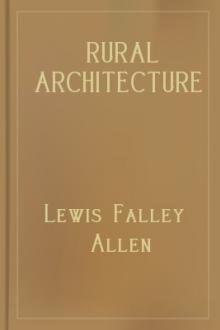Rural Architecture - Lewis Falley Allen (books recommended by bts TXT) 📗

- Author: Lewis Falley Allen
- Performer: -
Book online «Rural Architecture - Lewis Falley Allen (books recommended by bts TXT) 📗». Author Lewis Falley Allen
There is an affectation of cottage building, with some people who, with a seeming humility, really aim at higher flights of style in living within them, than truth of either design or purpose will admit. But as such cases are more among villagers, and those temporarily retiring from the city for summer residence, the farm cottage has little to do with it. Still, such fancies are contagious, and we have occasionally seen the ambitious cottage, with its covert expression of humility, insinuating itself on to the farm, and for the farmer's own family occupation, too, which at once spoiled, to the eye, the substantial reality of the whole establishment. A farmer should discard all such things as ornamental cottages. They do not belong to the farm. If he live in a cottage himself, it should be a plain one; yet it may be very substantial and well finished—something showing that he means either to be content in it, in its character of plainness, or that he intends, at a future day, to build something better—when this may serve for the habitation of one of his laborers.
The cottage should never occupy a principal, or prominent site on the farm. It should take a subordinate position of ground. This adds to its expression as subordinate in rank, among the lesser farm buildings. A cottage cannot, and should not aspire to be chief in either position or character. Such should be the farm house proper; although unpretending, still, in style, above the cottage; and if the latter, in addition, be required on the farm, it should so appear, both in construction and finish; just what it is intended for—a tenement for economical purposes.
There is another kind of cottage, the dwellers in which, these pages will probably never reach, that expresses, in its wild structure, and rude locality, the idea of Moore's pretty song—
"I knew by the smoke that so gracefully curled
Above the green elms, that a cottage was near."
Yet, in some parts of our country, landlords may build such, for the accommodation of tenants, which they may make useful on the outskirts of their estates, and add indirectly to their own convenience and interest in so doing. This may be indulged in, poetically too—for almost any thinking man has a spice of poetry in his composition—vagabondism, a strict, economizing utilitarian would call it. The name matters not. One may as well indulge his taste in this cheap sort of charitable expenditure, as another may indulge, in his dogs, and guns, his horses and equipages—and the first is far the cheapest. They, at the west and south, understand this, whose recreations are occasionally with their hounds, in chase of the deer, and the fox, and in their pursuit spend weeks of the fall and winter months, in which they are accompanied, and assisted, as boon companions for the time, by the rude tenants of the cottages we have described:
"A cheerful, simple, honest people."
Another class of cottage may come within the farm enclosures, half poetical, and half economical, such as Milton describes:
"Hard by a cottage chimney smokes,
From betwixt two aged oaks;"
and occupied by a family pensioner and his infirm old wife—we don't think all "poor old folks" ought to go to the alms-house, because they cannot work every day of the year—of which all long-settled families of good estate have, now and then, one near to, or upon their premises. Thousands of kind and liberal hearts among our farming and planting brethren, whose impulses are—
"Open as the day to melting charity,"
are familiar with the wants of those who are thus made their dependents; and in their accommodation, an eye may be kept to the producing of an agreeable effect in locating their habitations, and to rudely embellish, rather than to mar the domain on which they may be lodged.
In short, cottage architecture, in its proper character, may be made as effective, in all the ornament which it should give to the farm, as that of any other structure; and if those who have occasion for the cottage will only be content to build and maintain it as it should be, and leave off that perpetual aspiration after something unnatural, and foreign to its purpose, which so many cottage builders of the day attempt, and let it stand in its own humble, secluded character, they will save themselves a world of trouble, and pass for—what they now do not—men possessing a taste for truth and propriety in their endeavors.
HOUSE AND COTTAGE FURNITURE.This is a subject so thoroughly discussed in the books, of late, that anything which may here be said, would avail but little, inasmuch as our opinions might be looked upon as "old-fashioned," "out of date," and "of no account whatever,"—for wonderfully modern notions in room-furnishing have crept into the farm house, as well as into town houses. Indeed, we confess to altogether ancient opinions in regard to household furniture, and contend, that, with a few exceptions, "modern degeneracy" has reached the utmost stretch of absurdity, in house-furnishing, to which the ingenuity of man can arrive. Fashions in furniture change about as often as the cut of a lady's dress, or the shape of her bonnet, and pretty much from the same source, too—the fancy shops of Paré, once, in good old English, Paris, the capital city of France. A farmer, rich or poor, may spend half his annual income, every year of his life, in taking down old, and putting up new furniture, and be kept uncomfortable all the time; when, if he will, after a quiet, good-tempered talk with his better-half, agree with her upon the list of necessary articles to make them really comfortable; and then a catalogue of what shall comprise the luxurious part of their furnishings, which, when provided, they will fixedly make up their mind to keep, and be content with, they will remain entirely free from one great source of "the ills which flesh is heir to."
It is pleasant to see a young couple setting out in their housekeeping life, well provided with convenient and properly-selected furniture, appropriate to all the uses of the family; and then to keep, and use it, and enjoy it, like contented, sensible people; adding to it, now and then, as its wear, or the increasing wants of their family may require. Old, familiar things, to which we have long been accustomed, and habituated, make up a round share of our actual enjoyment. A family addicted to constant change in their household furniture, attached to nothing, content with nothing, and looking with anxiety to the next change of fashion which shall introduce something new into the house, can take no sort of comfort, let their circumstances be ever so affluent. It is a kind of dissipation in which some otherwise worthy people are prone to indulge, but altogether pernicious in the indulgence. It detracts, also, from the apparent respectability of a family to find nothing old about them—as if they themselves were of yesterday, and newly dusted out of a modern shop-keeper's stock in trade. The furniture of a house ought to look as though the family within it once had a grandfather—and as if old things had some veneration from those who had long enjoyed their service.
We are not about to dictate, of what fashion household furniture should be, when selected, any further than that of a plain, substantial, and commodious fashion, and that it should comport, so far as those requirements in it will admit, with the approved modes of the day. But we are free to say, that in these times the extreme of absurdity, and unfitness for use, is more the fashion than anything else. What so useless as the modern French chairs, standing on legs like pipe-stems, garote-ing your back like a rheumatism, and frail as the legs of a spider beneath you, as you sit in it; and a tribe of equally worthless incumbrances, which absorb your money in their cost, and detract from your comfort, instead of adding to it, when you have got them; or a bedstead so high that you must have a ladder to climb into it, or so low as to scarcely keep you above the level of the floor, when lying on it. No; give us the substantial, the easy, the free, and enjoyable articles, and the rest may go to tickle the fancy of those who have a taste for them. Nor do these flashy furnishings add to one's rank in society, or to the good opinion of those whose consideration is most valuable. Look into the houses of those people who are the really substantial, and worthy of the land. There will be found little of such frippery with them. Old furniture, well-preserved, useful in everything, mark the well-ordered arrangement of their rooms, and give an air of quietude, of comfort, and of hospitality to their apartments. Children cling to such objects in after life, as heir-looms of affection and parental regard.
Although we decline to give specific directions about what varieties of furniture should constitute the furnishings of a house, or to illustrate its style or fashion by drawings, and content ourself with the single remark, that it should, in all cases, be strong, plain, and durable—no sham, nor ostentation about it—and such as is made for use: mere trinkets stuck about the room, on center tables, in corners, or on the mantel-piece, are the foolishest things imaginable. They are costly; they require a world of care, to keep them in condition; and then, with all this care, they are good for nothing, in any sensible use. We have frequently been into a country house, where we anticipated better things, and, on being introduced into the "parlor," actually found everything in the furniture line so dainty and "prinked up," that we were afraid to sit down on the frail things stuck around by way of seats, for fear of breaking them; and everything about it looked so gingerly and inhospitable, that we felt an absolute relief when we could fairly get out of it, and take a place by the wide old fireplace, in the common living room, comfortably ensconced in a good old easy, high-backed, split-bottomed chair—there was positive comfort in that, when in the "parlor" there was nothing but restraint and discomfort. No; leave all this vanity to town-folk, who have nothing better—or who, at least, think they have—to amuse themselves with; it has no fitness for a country dwelling, whatever. All this kind of frippery smacks of the boarding school, the pirouette, and the dancing master, and is out of character for the farm, or the sensible retirement of the country.
In connection with the subject of furniture, a remark may be made





Comments (0)